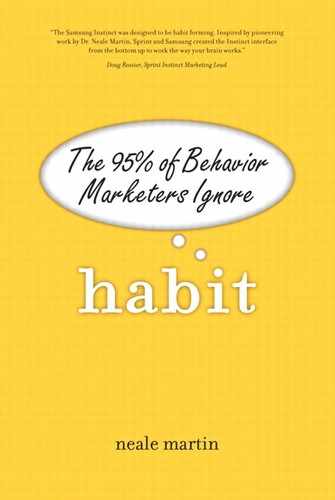1. How Habits Undermine Marketing
While driving to a meeting on the outskirts of Atlanta on a beautiful spring afternoon, I had the disconcerting experience of being unable to recall the last 10 miles of highway. Apparently, I had successfully navigated a 4,000-pound car at speeds in excess of 70 mph, responding to hundreds of cars around me, without any conscious control of my actions for at least ten minutes. This experience, familiar to most of us, illustrates the power and scope of the unconscious mind.
I was particularly aware of this phenomenon on a bright April day because I was on my way to a meeting with a client to discuss the pervasive role of habits in influencing customer behavior. This common example of driving on autopilot makes it easier to understand that we do the same thing in almost every phase of our waking life.
When we think of what it means to be human, we typically think of the attributes of our conscious mind—our ability to remember facts and faces, to solve complex problems, to create art and science. Indeed, our memories of the events of our lives create the sense of our personal identity. Yet for all the conscious mind’s remarkable abilities, neurobiologists and cognitive psychologists contend that the unconscious mind controls as much as 95% of human behavior.[1] The conscious mind decides to go to a meeting—the unconscious mind drives the car.
[1] Philosophy in the Flesh: The Embodied Mind and Its Challenge to Western Thought, George Lakoff and Mark Johnson, Basic Books, 1999.
It seems counterintuitive that the massive amount of conscious processing power sitting atop our bodies should just be along for the ride. However, from an evolutionary perspective, significant benefits exist from just such an arrangement. This twin mechanism enabled our Serengeti ancestors to hunt for food without becoming food. Today these dual processors make it possible to talk on a cell phone while we drive.
Although multiple names have been given to the two distinct types of mental processing, in this book, we refer to the part of the brain where conscious cognitive processing occurs as the executive mind. We call the region of the brain responsible for unconscious processing the habitual mind.[2] The executive mind is where we consciously store and retrieve memories, create intentional thought, and logically solve problems. The executive mind can think about both the past and the future.
[2] Giving names to structures and processes within the brain is somewhat arbitrary and risks giving the false impression that we really understand what we are naming. The executive and habitual minds are used largely as a convenience that reflects conventional understanding of these terms.
The habitual mind handles a vast array of functions, from regulating your heartbeat and body temperature, to storing thousands of responses to previously learned behaviors. The habitual mind is guided by the past but lives in the present.
Our understanding of the brain has been revolutionized in the past two decades. Through both clever laboratory experiments with animals and new technologies that enable us to look inside a working human brain, what we have learned during the last 20 years challenge much of what we thought we knew. Although these insights contradict basic assumptions in disciplines as divergent as psychiatry and economics, nowhere are the implications more profound than in marketing.
A quick review illustrates the point.
